China’s youth demonstrates patriotism through launching emoji and sticker ‘war’
In the past week, an Internet war caught everybody's attention in China. What started out as boycott of Taiwan star Chou Tzu-yu developed into a sticker and emoji battle, led by mainland's biggest online forum and aimed at pro-Taiwan independence media outlets and public figures' accounts on Facebook. While some may regard this as a naive act that won't accomplish anything, it shows how young people choose to express their emotions on social issues and an undercurrent of patriotism.
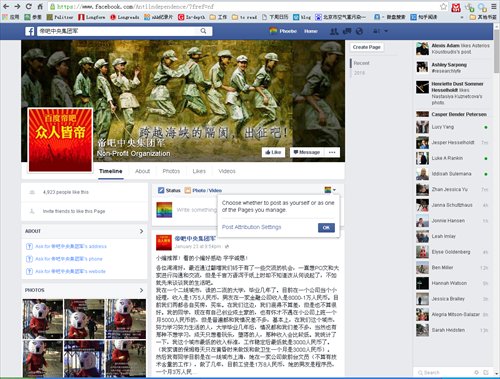
Home page of Di Ba on Facebook
It was only by accident that Xiang Xiangping came across a message online last Wednesday that declared "Di Ba" will go on a "crusade" again.
The message had a picture attached to it, a map of China against a black background. Written in bold white letters was "Taiwan belongs to my country," and a slogan in red, "When Di Ba goes into battle, nothing will grow."
Her curiosity piqued, she read on.
The 23-year-old from the Chinese mainland but studying in Britain found out that Di Ba, an online forum sponsored by Baidu, China's biggest search engine, was calling for a "crusade" against public figures and media outlets on Facebook that are pro-Taiwan independence, by gathering people to flood these pages with messages.
Recruiting for the campaign had just started, but the events that led up to it had been brewing for days. It started with Taiwan pop star Chou Tzu-yu being attacked for being allegedly pro-Taiwan independence. Netizens across the Straits had argued back and forth on the issue for a couple of weeks, which naturally included lots of vitriol. In the end, users of Di Ba decided to show Taiwan netizens their feelings en masse.
Xiang was shocked after she read the news and immediately decided to join. She always thought there was only a small number of people supporting Taiwan independence, but she found out even some mainstream Taiwan media have written pro-independence articles. Furthermore, she couldn't stand how biased many people in Taiwan seemed to be towards the mainland.
"Most of them described the mainland as a closed-off place with no freedom at all, and we want to show them the real situation and our real thoughts," she said.
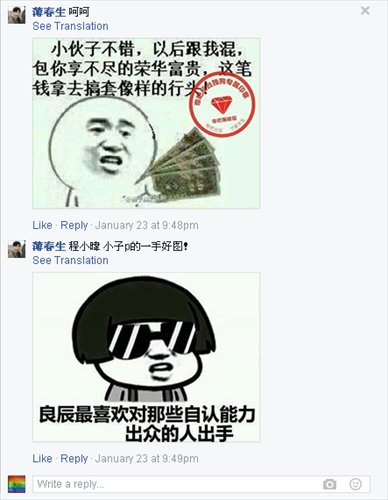
Comments posted by Di Ba members on Facebook
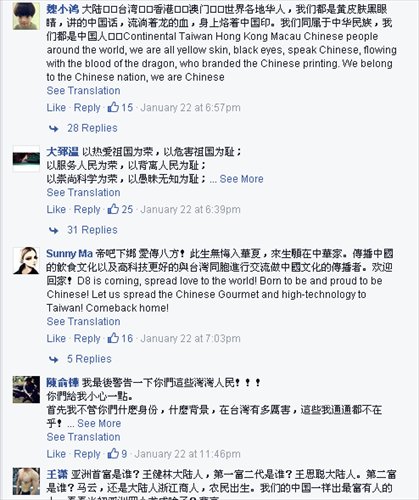
Comments posted by Di Ba members on Facebook
Rise of a new culture
The campaign started at 7 pm last Wednesday and was surprisingly well-organized. Participants, using virtual private network software from the Chinese mainland, were separated into different groups and were given various tasks. These included collecting information on which pages to bombard, translating poems and pro-China slogans into different languages, and making graphic stickers. There was a headquarters and administrators of the forum directed the "battle."
Xiang joined a group on Facebook that fought on the "frontline" by posting stickers on targeted home pages. She saw that there were about 30,000 people online in her group at the same time. The most popular stickers included former President Hu Jintao's "eight prides and eight shames," anti-Taiwan independence declarations, as well as photos of food and famous scenery on the mainland.
In an effort to avoid the vulgarity and negativity that usually accompany online discussions, the organizers continually emphasized to their "foot soldiers" that they should avoid cursing and simply post slogans and images of the mainland.
While people who aren't familiar with China's Internet culture might think this "crusade" came out of nowhere, in fact it's in line with the forum's style. Di Ba started out as a fan forum for former Chinese soccer player Li Yi. But in 2005, the forum became a place for fans to make fun of him, when he acted arrogantly in a TV interview.
Gradually, netizens started discussing social issues and news in a sarcastic, mocking manner. Young people go to Di Ba to enjoy its creative content and many popular neologisms in recent years originated in the forum, such as diaosi (loser) and gaofushuai (tall, rich and handsome man).
As of now, Di Ba has more than 20 million registered users and there are over 80 million posts, and both numbers are increasing rapidly. In a country where the number of netizens is close to 700 million, Di Ba is without a doubt one of the biggest online communities.
Because of the time difference, Xiang came to the "battle" later than her peers at home. By the time she opened up Facebook, many pages had already fallen.
Through their sheer numbers, Di Ba users were able to exercise real power over the discussion. Within an hour, two pro-Taiwan independence media outlets, Apple Daily and setn.com had to close down their comment sections.
The act was criticized by some commentators across the Straits. Many called the young people unreasonable, hot-tempered and immature.
Some well-known Weibo bloggers, or Big V's, commented that such acts will only repel people in Taiwan and push them further away.
Ren Zhiqiang, a retired real estate icon, called this act "a form of class struggle."
Likewise, the reaction on the Taiwan side was emotional as well. Many people in the island expressed annoyance, calling the bombardment trolling and online spamming, while others started fighting back. Many posts surfaced of people in Taiwan picking faults with the mainland, talking about corruption, the "lack of freedom" and other social issues.
But still others pointed out this is a typical online phenomenon and shouldn't be made a fuss over.
Yang Xuedong, a research fellow at the Central Compilation and Translation Bureau, said he thinks this event showed the public venting their emotions rather than making a political statement.
"The Internet era has given the public more ways to express themselves … many people have a sense of participation," he said. "Participants don't care about their identities; they just want to be seen, to get attention."
The attitude was present during this "war." When the "troops" stormed Taiwan public figures' Facebook pages, many weren't looking to communicate with the other side, but were only stating their own thoughts.
Many netizens also joined in for fun, to feel a sense of participation.
Gong Chiqiu, a novelist who joined a Di Ba chat group to watch the "battle," said he saw unprecedented enthusiasm among members.
"People were pretty riled up, they kept posting messages in the group in a speedy manner," he said.
At the same time, songs were being played in the background to keep up people's spirits. It was truly an online rally.
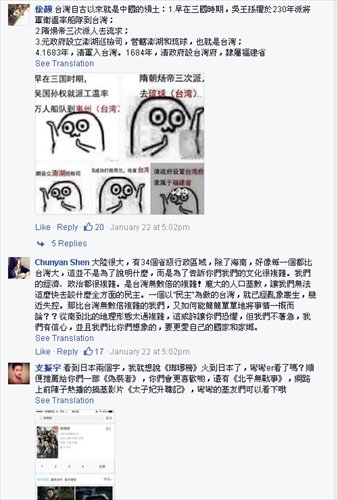
Comments posted by Di Ba members on Facebook
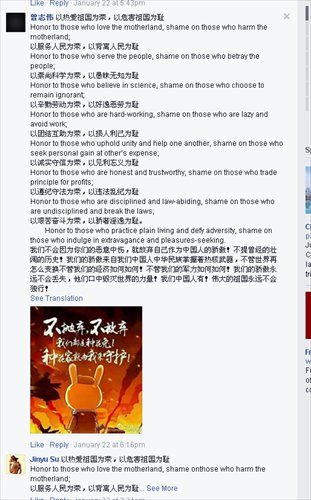
Comments posted by Di Ba members on Facebook
Patriotic undercurrent
This rally was in part driven by patriotism, a strand which was also apparent in past Di Ba conquests.
In the past, Di Ba has led other battles that stemmed from social issues.
In 2007, members spammed the fan forum of Rainie Yang, a Taiwan singer, because when she was told the anti-Japanese invasion war lasted for eight years on a TV show, she commented "Only eight years?" Enraged, members went to her forum and posted over 100 pages of messages within two hours.
One commander, who used the name "GK-Loma," said the flood of comments aimed to help others understand a "true China, a beautiful China, a China without warfare."
The 24-year-old stayed up for two nights planning the raid. He was present throughout the whole event, from the initial planning, to battlefield designation, to summarizing the events after they were over.
On Di Ba's official social media accounts, the theme was also stressed. All the way through the "battle," the organizers called for members to remain calm and reasonable, as well as calling out for more materials presenting the mainland's scenery and food to show the Taiwan public.
Xiang said as the battle went on, she saw more and more people choosing to post photos and text that showed the mainland's development in technology and society, and how rich the history and culture are, instead of just posting stickers and emojis.
Administrators in her group also directed the "troops" towards people posting pro-Taiwan independence arguments or demeaning comments concerning the mainland and members flocked there to argue back.
But now, nearly a week after the initial "crusade," it doesn't seem to matter whether this online battle brought positive or negative effects to the relationship across the Straits, as it ended with a surprising twist.
Over the weekend, a gradual shift in tone occurred. Instead of arguing back and forth, netizens across the Straits started discussing food, travel, TV shows, and many even started posting their own photos and turned the Facebook "battlegrounds" into dating sites. People from Taiwan also joined the groups and started asking questions about the mainland.
A spokesperson for Di Ba told the media that this change was surprising and organizers felt "brotherly warmth," according to guancha.com.
"Our goal is to build a platform for communication for young people across the Straits with the premise of mutual respect and understanding," he said. "That goal has not yet been realized, but it's a wish for all mainlanders."
Some netizens commented on the page about the surprising turn of events, saying "change came too fast, faster than a tornado." But many welcomed the change. Even though the "crusade" originated from differences in political stance, young netizens say they found they stem from the same culture and speak the same language, and there's willingness on both sides to communicate.
"In the end, it occurred to us that the people in Taiwan don't really know much about the mainland … so they became curious and we started talking," Xiang said. "What can I say? No discord, no concord, I guess."
Newspaper headline: Online crusade